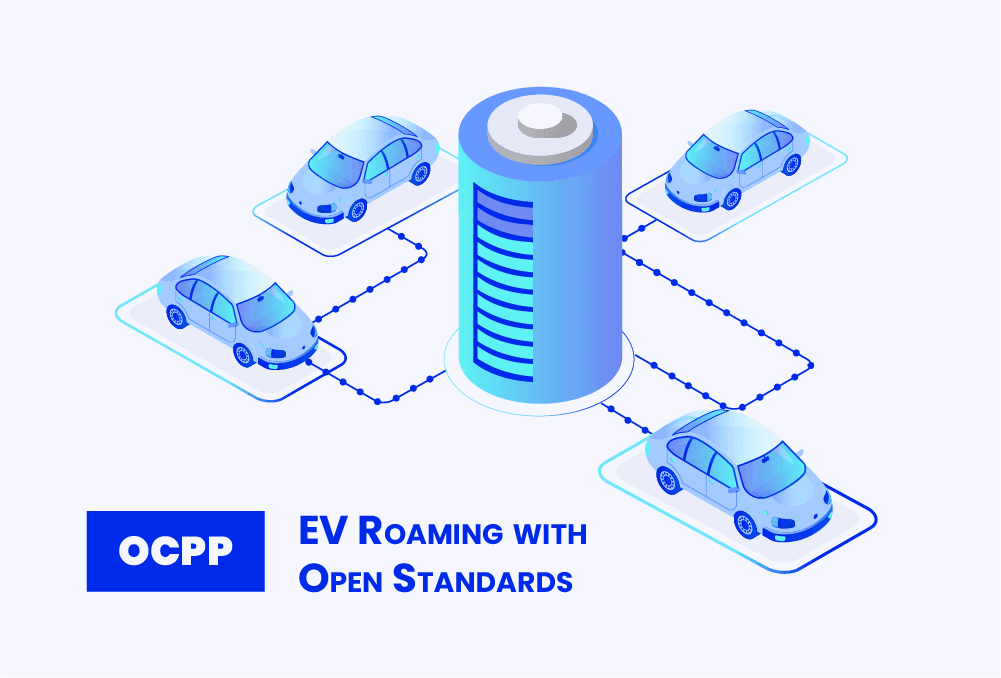Interoperability: the backbone of any thriving EV charging network.
Without it, we'd be looking at a patchwork of systems struggling to talk to each other. And that's not the kind of future anyone wants to plug into.
That's where open standards come in. Designed to eliminate silos and future-proof infrastructure, they're essential for scaling EV charging networks smartly and sustainably. Among them, the Open Charge Point Protocol (OCPP) stands out as the go-to framework for enabling communication between charging stations and backend systems.
In this article, we'll break down OCPP's role in the eMobility ecosystem and unpack the differences between its key versions: 1.6, 2.0, and 2.0.1, so you can better understand where the industry's headed and what it means for your EV charging business or tech stack.
What is the Open Charge Point Protocol?
OCPP (Open Charge Point Protocol) is an open-source communication standard that enables electric vehicle (EV) charging stations to interact seamlessly with backend systems, such as Charging Station Management Systems (CSMS). It connects charging hardware to software platforms, regardless of the manufacturer.
Developed by the Open Charge Alliance (OCA), OCPP ensures interoperability across networks, making it easier for Charging Point Operators (CPOs) to manage stations, process billing, enable remote diagnostics, and scale their EV charging infrastructure.
OCPP is one of the most popular EV charging protocols, and an open standard, meaning anyone can develop applications that use it. However, it is not a mandatory industry requirement; while the OCA highly recommends its use, EVSE manufacturers are not obligated to produce OCPP-compliant hardware.
In terms of its role in the EV charging ecosystem, understanding OCPP's placement is crucial. OCPP acts as the communication syntax connecting the Charging Station Management System (CSMS) used by CPOs to control their networks with the physical charging stations.
Key operations covered by OCPP include:
- Charging session authorization for identifying EV drivers and starting/stopping charges.
- Billing information, to transfer charging event data to the backend system for user billing.
- EV charger reservation.
- Real-time data transfer to CSMS, to enable CPOs to monitor station statuses (e.g., in-use, faulted).
- Remote control and advanced diagnostics for issue resolution and station uptime
- Issue recognition and alerts.
- Smart charging features to optimize energy distribution
Unlike proprietary protocols that lock you into a specific ecosystem, OCPP is vendor-agnostic and future-proof. It empowers eMobility providers to build scalable, secure, and flexible networks, critical as EV adoption accelerates globally.
TL;DR: What makes OCPP essential?
- Promotes interoperability in EV infrastructure
- Reduces vendor lock-in with open standards
- Supports real-time communication and smart charging
- Backed by a global ecosystem of stakeholders
Pro Tip for CPOs & OEMs: Adopting the latest OCPP version (currently 2.0.1) ensures better security, ISO 15118 compatibility (Plug & Charge), and long-term scalability
Versions and evolution of the Open Charge Point Protocol
Over time, the Open Charge Point Protocol (OCPP) has evolved to support new technical capabilities, stronger security, and better compatibility with modern charging infrastructure. While multiple versions exist, the most widely implemented today is OCPP 1.6, with OCPP 2.0.1 being the most current and feature-rich version. The following sections outline the key differences and improvements introduced in each.
OCPP 1.6
Released as a major step forward from version 1.5 (now largely obsolete), OCPP 1.6 added a wide range of enhancements that made it the de facto industry standard for several years. Below is a summary of the most notable features and improvements introduced in this version.
Some of the notable improvements in OCPP 1.6 include:
- Smart Charging functionality was added.
- A binding to JSON over WebSocket was introduced as a transport protocol, reducing data usage and enabling communication through NAT routers.
- Extra statuses were added to the ChargePointStatus enumeration, offering more insight into station status.
- Changes to the structure of MeterValues.req to remove XML attributes, which supports JSON compatibility.
- New measurands in the enumeration allowed for more detailed station data (e.g., EV State of Charge).
- The TriggerMessage function enabled the central system to request data from the charge point.
- A new Pending status was added to the RegistrationStatus enumeration used in BootNotification.conf.
- Improved configuration keys, giving CPOs clearer guidelines for setup.
- Messages and configuration keys were split into profiles for gradual or partial implementation.
- Various ambiguities were clarified, including connector numbering and request/response handling.
(Please note: this extract comes from the OCPP 1.6 documentation, available in full from the Open Charge Alliance.)
OCPP 2.0 and OCPP 2.0.1
OCPP 2.0 was introduced in April 2018. However, certain issues were later discovered, some significant enough to require backward-incompatible changes. For example, adjustments like increasing the security certificate length couldn't be resolved by documentation tweaks alone. As a result, OCPP 2.0.1 was released and is now the version recommended by the Open Charge Alliance for use in production environments.
As the OCPP standard evolves, it's essential for charging station operators and manufacturers to stay updated with the latest versions. Doing so ensures compatibility with the latest CSMS software and access to new OCPP features.
Key enhancements in OCPP 2.0 and 2.0.1
Compared to version 1.6, these newer versions introduced several impactful changes:
- Support for ISO 15118, enabling features such as Plug and Charge.
- Complete removal of SOAP in favor of JSON over WebSocket, simplifying communication protocols.
- Significant security enhancements, addressing previous vulnerabilities.
- Device management and monitoring replaced older Status Notifications for improved infrastructure control.
- Enhanced transaction handling to support more complex and larger-scale EV charging networks.
The official Open Charge Point protocol documentation consists of 7 parts:
- Introduction
- Architecture and topology
- Specification and Appendices
- Schemas
- JSON over WebSockets implementation guide
- Certification profiles
- Test cases
Building smarter, scalable EV charging networks with OCPP
As EV adoption surges, seamless communication between charging stations and backend systems becomes a foundation, not a feature. The Open Charge Point Protocol (OCPP) offers exactly that: a standardized, future-proof way to ensure your infrastructure can grow, adapt, and stay secure.
Whether you're deploying your first charging station or you're already a larger network operator, OCPP compliance ensures you're staying ahead.
FAQs about OCPP (Open Charge Point Protocol)
What is OCPP, and why is it important?
OCPP is an open-source communication protocol for EV charging stations that ensures different hardware and backend systems can work together seamlessly. It improves interoperability, scalability, and network management for charging station operators.
How does the OCPP protocol work?
The OCPP (Open Charge Point Protocol) enables real-time, two-way communication between EV charging stations and Charging Station Management Systems (CSMS). Using WebSocket and JSON (in versions 1.6 and 2.0.1), the protocol manages key operations like session authorization, billing data transfer, remote control, diagnostics, and smart charging. OCPP standardizes how messages are structured and exchanged, ensuring interoperability across different hardware and software proprietary systems in the EV ecosystem.
What's the difference between OCPP 2.0 and 2.0.1?
OCPP 2.0.1 is an enhanced and stable version of OCPP 2.0, introduced to address technical gaps, security vulnerabilities, and interoperability issues found in the original 2.0 release. While both versions support advanced features like Plug and Charge (via ISO 15118) and smart charging, OCPP 2.0.1 includes critical fixes without backwards compatibility, making it the version officially recommended by the Open Charge Alliance for all new implementations. It ensures smoother deployments, better security compliance, and full compatibility with certified systems.
Is OCPP mandatory for EV chargers?
No. OCPP protocol is a recommended but not mandatory standard. Hardware manufacturers and CPOs are encouraged to adopt it and get OCPP certification for greater interoperability and flexibility.
Does OCPP support Plug and Charge?
Yes, starting from OCPP 2.0, the protocol includes support for ISO 15118, which enables Plug and Charge capabilities, allowing electric vehicles to automatically identify themselves and begin charging without manual authorization.
What is the Solidstudio OCPP Gateway, and why is it essential for EV charging infrastructure?
The Solidstudio OCPP Gateway is a hardware-agnostic bridge that connects EV charging stations with backend software using the OCPP 1.6 or 2.0.1 protocol. Designed for stability and scalability, it enables Charge Point Operators to manage remote diagnostics, smart charging, and transaction handling across diverse EV charger models, saving time, boosting reliability, and ensuring full OCPP compliance.
What is the Solidstudio OCPP Proxy, and how does it simplify EV charging network operations?
The Solidstudio OCPP Proxy is a lightweight, high-performance tool that enables dynamic routing of OCPP WebSocket traffic between charging stations and multiple central management systems. Ideal for network migrations, testing, and disaster recovery, it allows Charge Point Operators to duplicate traffic, inspect logs, debug communication, and switch backend connections with a single click, ensuring seamless interoperability across large-scale EV infrastructures.

